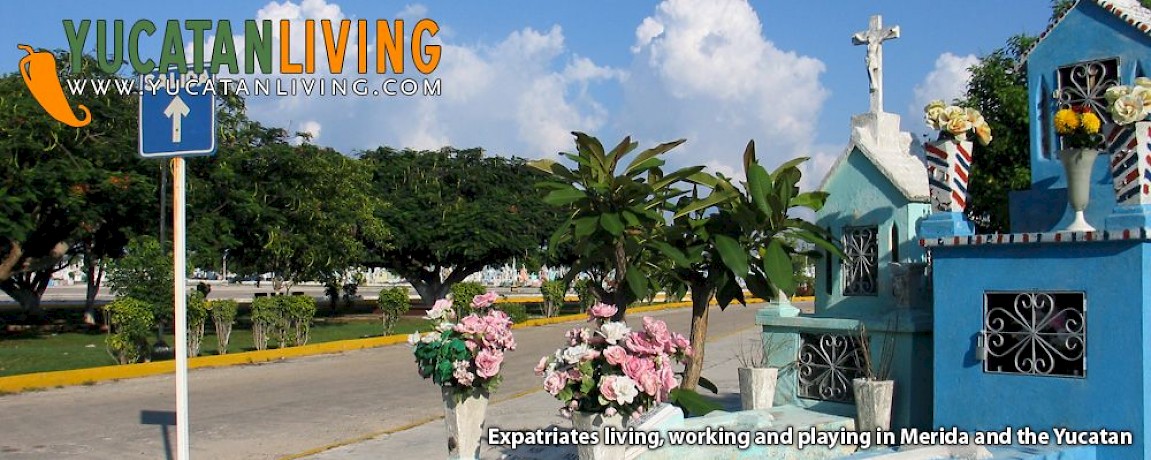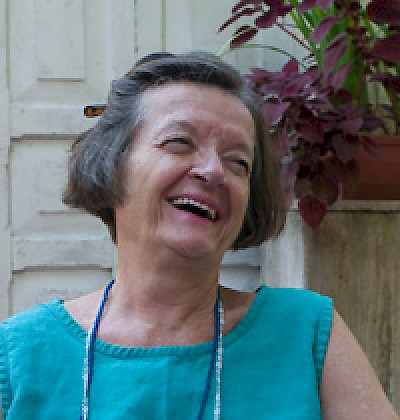Death in A Foreign Country
We're lucky enough to be good friends with two of the three women who did the research for a new brochure about preparing for your death in a foreign country. Lorna Gail Dallin was the manager of the Merida English Library when we first moved here, and our neighbor at the time. Martha Lindley has only lived here for a little over a year, but she was our neighbor when we were renting, waiting for our house to be finished. We don't know Cheryl Caddy, but from the story she told about why she got involved in this project, it seems we also have some things in common. While death isn't a popular topic of discussion, it is an important one (especially for those of us far from loved ones), and these three women have brought their thoroughness, practicality, organization, and sense of humor to bear on this subject, for the benefit of all of us.
The Final Adios is the name of this small pamphlet (or a PDF file downloadable here) that outlines what preparations you can make to prepare your survivors for dealing with the monton (huge pile) of paperwork that will be required in the event of your death in what is to you a foreign land. The group presented the pamphlet and the information in it to the Merida Men's Club, the Merida English Library and to the International Women's Club in Merida, where we joined them for their final presentation.
Cheryl stood up first to explain why they had researched this subject in the first place. She and her husband live here in Merida, but their daughter and heir lives in the United States. As she put it, one day Cheryl had a disturbing vision of her tear-stained daughter's face as she arrived in Merida after she and her husband had both died unexpectedly. In her waking dream, her daughter had come to take care of matters. Cheryl's daughter doesn't speak Spanish, she doesn't know how to get to their house, she didn't have the keys if she did know and she didn't know in which bank they kept their money. Suddenly, Cheryl realized that if she loved her daughter, she must do something to make her daughter's work in the midst of her grief just a little bit easier. Listening to her that morning, we identified with this vision, as our own daughter had called us just a few months ago, worried about the same possibility.
To understand what needed to be prepared, Cheryl joined with Lorna Gail and Martha to investigate. Early on, they agreed that once they had the information, they would share it with the local expat community in Merida. The three of them spent countless hours talking with government officials (Mexican, American and Canadian), visiting funeral parlors and talking with others who had gone through the experience. They distilled what they learned into The Final Adios, a short document about dying in the Yucatan that tells you everything you need to know to prepare for your death.
Martha and Lorna Gail presented the document, mentioning a few important points, such as the need for an apostille (a special seal) on official documents for Americans, and the importance of having all documents translated into Spanish by an official translator (all this is covered in the document). They also reminded us of some things we might overlook, like preparing our survivors for the shock of dealing with a different culture. Martha suggested we tell our loved ones that the workers in the funeral parlor will probably be dressed in t-shirts, not tuxedos, and that is not a sign of disrespect nor an indication of their abilities. Instead it is an indication of how much a part of daily life they consider death to be here in Mexico.
For those of us who live here, but whose families live "there", what they have prepared is a valuable roadmap for a project we should probably all undertake. It is also a good synopsis to have on hand for your successors. It includes instructions on who to call depending on where the person in question died, what to expect from a funeral parlor, who in Merida are the official document translators, what documents need to be collected and translated and more.
If you live here, no matter how old you are, we encourage you to read it and then do the work. As Lorna Gail reminded everyone, if you don't do it, everything will happen anyway. With all the paperwork in order, your survivors might be able to dispose of your body within 24 hours. Without the right paperwork, it can take up to a week or more. It might take years for judges to decide what to do with your Mexican property if you don't leave instructions, but with the right paperwork, it will happen a lot faster.
If you do your homework now, however, you are leaving a final gift for your survivors, making their days after your death that much easier. As the title suggests, whatever preparation you have done beforehand is, from you to them, the final Adios.
Editors Note: The Final Adios brochure will be available at the Merida English Library while they last. Now and ever after, it will also be available as a downloadable and printable PDF right here on Yucatan Living. We encourage anyone who has useful information on this subject to leave their comments to this article for the edification of the whole community.












Comments
Gayle Collins 10 years ago
Has this document "The Final Adios" been updated since it's publication? If the answer is yes, how do I get a copy of the updated information? I live in Playa del Carmen and will update the information that I can for Playa.
Reply
new to merida 14 years ago
Great article! Thank you!
Reply
Jose San-Pedro 15 years ago
Congratulations to all of you for elucidating the practico-legal issues of a death in Merida/Yuvcatan.
This information is essential to help the living (those left behind to secure arrangements) know what to expect, what to do, and how to navigate the system. It also helps those that want to plan ahead ('just in case') in order to control outcomes and also to avoid being a burden on others.
My only request would be to look beyond pracico-legal matters (vital as they are) and explore the spiritual, cultural, and emotional components of the dying journey. Part of the delightful irony in all of this is that North Americans (US/Canada) come from death-phobic cultures while Mexicans experience death/mortality as a natural part of the life-cycle!. Much can be learned as we listen to each other and share attitudes towards dying, death, end-of-life, and grief (I believe 'grief' has finally come to be seen in 'Mexican ways' not as an event that needs closure in order to 'get over it' but rather as maintaining a connection with the deceased while learning how to function in a changed world). It's like two contrastingly different universes of meaning (hence, lots of room for collaborative dialogues). Hopefully, for those living in Merida they can partake of the annual 'Dia de los Muertos' (both the local interpretation through a Mayan lens -Hanal Pixan- , and the national narratives weaved thorugh poetry, engravings and folkore (La Catrina).
One other comment would be to explore palliative (end-of-life) care resources in the Merida area (tanatologia), both in terms of hospital-based palliative care resources and home-based palliative-hospice supports.
Cheers
Jose
Reply
Sara Lilley 16 years ago
Thanks for your message, Martha. Actually, I have visited several times since then and am in the process of making a "preliminary" permanent move in August of this year. It may be permanent depending on how it goes. I love the Yucatan and especially, Merida.
Es posible nos encontramos!
Reply
Martha Lindley 16 years ago
Sara, I am sorry for your loss. As you pointed out, the U.S. Consulate is enormously helpful and we are all grateful for that. Your experience mirrors what the funeral homes told us: they help ensure that you have all of the necessary paperwork and make a very difficult time more manageable. We are lucky to have them.
Thanks for your feedback. I hope you will come visit the Yucatan again.
Reply
Sara Lilley 16 years ago
Good article. This was my experience with "The Final Adios". In 2005 on vacation, my spouse unexpectedly died at our friend's house in a small village about 180 kilometers from Merida. Fortunately, the clinic doctor was in the village to sign a death certificate. The U.S. consulate was contacted and made arrangements with a funeral home in Merida to transport his body there for cremation. (It was his wish to be cremated.) The funeral home agent spent the whole next day with me visiting one agency after another to get all the paperwork done and I was able to return to the U.S. the day after that. Everyone--the U.S. consul, the funeral home agent, the hotel where I stayed in Merida, and of course, my friends helped me so lovingly at this difficult time. I will always be grateful that we were in the Yucatan among such good people.
Reply
Peggy 17 years ago
Just fyi, over here in the Chetumal area, September is Will month and you get quite a discount if you have your Mexican wills prepared in September. It may be the same in the Merida area. Thanks for the excellent info.
Reply
Joanne 18 years ago
Thank you for having this information available, however I would like to make a suggestion. Since the Emergency Information form is to help Police or other emergency workers who may have to assist us in a traffic accident or similar situation, shouldn't the form be in Spanish so they can read it? Or both English and Spanish?
Reply
Ann Guerin 18 years ago
Thank you for sharing this wonderful eye-opening information. We are building our home in Costa Maya & we & many of our friends had no idea what was involved in the event of our death in Mexico.
Also, how can I find the tel. # in Merida, of the US Consulate (to get a human voice to speak with). I have one single tel # , all I ever get is a busy, busy, busy......
Reply
Dying To Get Out of Mexico - In The Roo Forums 18 years ago
[...] paperwork that will be required in the event of your death in what is to you a foreign land. Click HERE. __________________ Sharon A compromise is an agreement whereby both parties [...]
Reply
Martha Lindley 18 years ago
The Emergency Information Sheet is available on this link. We suggest you fill it out and put one on your refrigerator and have one in your car. That way, the information needed is immediately available.
We suggest you visit funeral homes in your community to ask any specific questions you have about cremation, burial or transferring the body to your home country for burial. Keep in mind that the Mexican culture is much more accepting of the inevitability of death; it is treated in a much more matter of fact manner. We did not find men dressed in dark suits and ties being somber. In Merida, they were in tee shirts and jeans and very relaxed and willing to talk.
I'm pleased others found the information useful. We did it for our loved ones and are happy to share it.
Reply
(0 to 11 comments)Next »